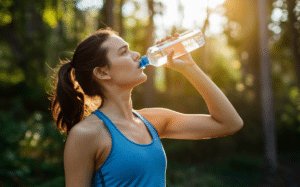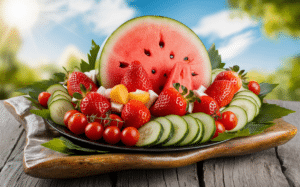Water is essential for life, playing a crucial role in nearly every bodily function, from regulating temperature to flushing out toxins. Yet, many of us underestimate the importance of staying adequately hydrated and may not even realize when we’re not drinking enough water. In this article, we’ll explore the telltale signs that indicate you may be lacking proper hydration and the impact it can have on your overall health and well-being.

Signs You’re Not Drinking Enough Water:
- Persistent Fatigue: Feeling tired and sluggish, even after a good night’s sleep, could be a sign of dehydration. When your body lacks adequate water, it struggles to transport oxygen and nutrients to cells, leading to fatigue and low energy levels.
- Dry Mouth and Lips: Dryness in the mouth and lips is a classic indicator of dehydration. When you’re not drinking enough water, saliva production decreases, resulting in a parched sensation in the mouth and cracked, chapped lips.
- Dark Urine: The color of your urine can provide valuable insight into your hydration status. Dark yellow or amber-colored urine is a sign of concentrated waste products and indicates that you need to drink more water to flush out toxins and maintain proper kidney function.
- Headaches and Dizziness: Dehydration can trigger headaches, migraines, and feelings of lightheartedness or dizziness. When you’re dehydrated, blood volume decreases, leading to reduced blood flow to the brain and potential neurological symptoms.
- Constipation: Adequate hydration is essential for maintaining healthy digestion and regular bowel movements. Without enough water, stool can become dry and difficult to pass, leading to constipation and discomfort.
- Muscle Cramps: Dehydration can contribute to muscle cramps, spasms, and stiffness, particularly during exercise or physical activity. Without proper hydration, muscles may not receive adequate electrolytes and nutrients, leading to involuntary contractions and discomfort.
- Poor Skin Health: Your skin is your body’s largest organ and requires adequate hydration to maintain elasticity, moisture, and a healthy appearance. Dehydration can lead to dry, flaky skin, accelerated aging, and an increased risk of skin conditions such as eczema and acne.
The Importance of Hydration for Health:
Proper hydration is essential for maintaining overall health and well-being. Water helps regulate body temperature, supports digestion and nutrient absorption, lubricates joints, cushions organs, and flushes out toxins. By staying adequately hydrated, you can enhance physical performance, improve cognitive function, boost immune function, and promote healthy aging.

Tips for Staying Hydrated:
- Drink water regularly throughout the day, aiming for at least 8-10 glasses (64-80 ounces) daily.
- Carry a reusable water bottle with you to ensure easy access to hydration wherever you go.
- Eat water-rich foods such as fruits and vegetables, which contribute to your overall fluid intake.
- Set reminders or use hydration tracking apps to help you stay on top of your water intake goals.
- Listen to your body’s thirst cues and drink water whenever you feel thirsty, as thirst is a signal that your body needs hydration.
Takeaways:
Staying adequately hydrated is essential for maintaining optimal health and vitality. By recognizing the signs of dehydration and prioritizing your water intake, you can support your body’s natural functions, enhance your overall well-being, and feel energized and revitalized every day. Remember, hydration is not just a choice; it’s a vital component of a healthy lifestyle that deserves your attention and care.
FAQs:
Q1. Can drinking too much water be harmful?
While rare, drinking excessive amounts of water can lead to a condition called water intoxication or hypothermia, which occurs when sodium levels in the blood become dangerously low. It’s essential to balance hydration with electrolyte intake and listen to your body’s cues.
Q2.How can I tell if I’m drinking enough water each day?
Pay attention to your body’s thirst signals, monitor the color of your urine (pale yellow to clear is ideal), and aim to drink enough water to stay hydrated throughout the day.
Q3. Are there any benefits to drinking water first thing in the morning?
Drinking water upon waking can help kick-start your metabolism, re-hydrate your body after a night of sleep, and support healthy digestion and elimination.
Q4. Can certain medications or medical conditions affect hydration levels?
Yes, certain medications, medical conditions (such as diabetes or kidney disease), and environmental factors (such as heat or humidity) can affect hydration levels and may require adjustments to fluid intake. It’s essential to consult with a healthcare professional if you have concerns about hydration or fluid balance.
Q5. What are some creative ways to stay hydrated if I don’t enjoy plain water?
You can infuse water with fresh fruits, herbs, or cucumbers for added flavor, drink herbal teas or coconut water, eat hydrating foods like watermelon or cucumber, or try flavored sparkling water as alternatives to plain water.
